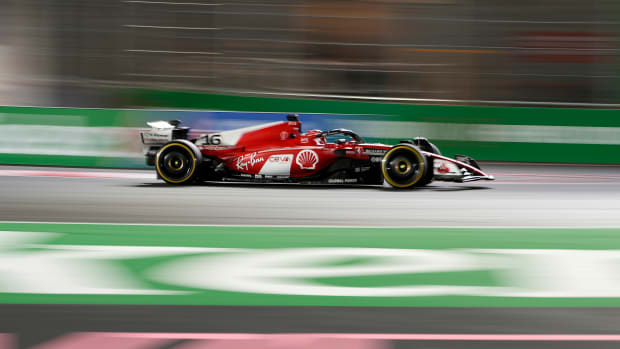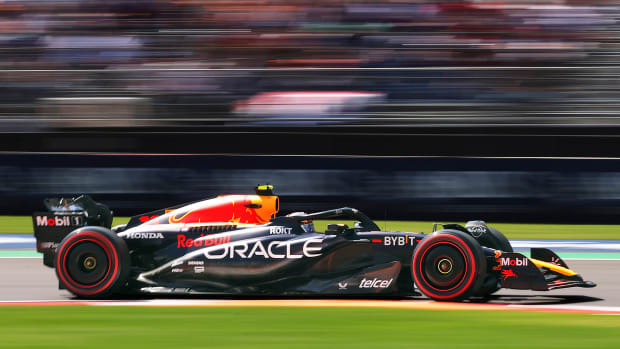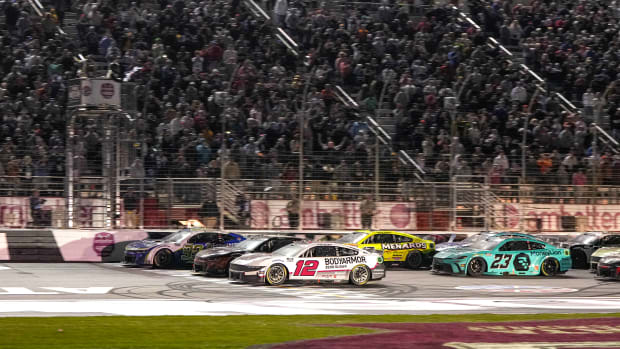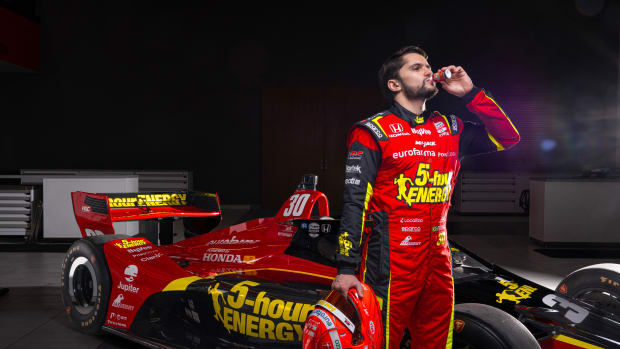Stewart says crash was '100 percent' accident
HUNTERSVILLE, N.C. (AP) For Tony Stewart, there was no greater joy than escaping his everyday life and climbing behind the wheel of a sprint car. He loves the feel, the way they drive, the purity he finds at all the tiny dirt tracks across the country.
When he broke his leg racing his sprint car a year ago, an injury that sidelined him for six months, he was almost defiant in his desire to never give up his hobby. But after the death of Kevin Ward Jr., who was killed when Stewart's car struck him as Ward walked on an upstate New York dirt track on Aug. 9, Stewart may never get back in a sprint car.
''I would say it's going to be a long time before you ever see me in a sprint car again, if ever. I don't have any desire at this moment to get back in a car,'' Stewart told The Associated Press in his first interview since a grand jury decided he would not be charged in Ward's death.
''If I had the option to go right now to a race, I wouldn't. I don't even know when I'll go to a sprint car race again to watch. I can promise you it's going to be a long time before you ever see me back in one.''
Sitting on his couch Thursday night in his Huntersville, North Carolina, home, a sprint car race in Arkansas was on mute on his television. Stewart's eyes were constantly drawn to the action. He can't help himself. It's where he came from, how he made his name and the one form of racing he simply couldn't walk away from, even as he was criticized for jeopardizing his lucrative NASCAR career by messing around in the dirt.
He just couldn't give it up. Not when he became a multi-millionaire and one of NASCAR's biggest names, not after good friend Jason Leffler was killed in a sprint car race last year, and not after his own injury led to three surgeries, a month in bed and forced him to miss NASCAR races for the first time in his career.
Stewart is addicted to the simplicity of sprint car racing, to racing at venues across the country where the crowd is starving for gimmick-free racing. He didn't care that a field full of drivers of varying ages and talent were racing for purses that rarely reach $5,000.
He made it his goal to give back to the sprint car community at every turn, especially after his accident. He improved the part that broke and caused his broken leg, and spent $110,000 on firesuits and helmets for nearly 50 drivers who needed updated safety equipment.
Stewart even paid for the embroidery on the firesuits. His only request? That his Tony Stewart Racing logo be placed in a position that would not be noticed during interviews.
Stewart has been grappling with the decision to leave sprint racing since his 2013 crash at an Iowa dirt track. He'd only returned to sprint car racing one month before Ward's death.
''It's hurt for 16 months to sit and be scrutinized for it,'' said Stewart, ''and to try to give back to a sport that you love, and every time you turn around, you've got to constantly defend yourself for doing something and trying to support something that you believe in and care about.''
Chuck Miller, race director and President of the Empire Super Sprints series that Stewart and Ward were racing in that night, understands how Stewart feels, but believes it would be a blow to sprint car racing if he never returned.
''I do hope that somewhere down the line he'll reconsider,'' Miller told AP. ''There aren't many drivers of his stature that have done what he's been able to do for all of motorsports, and especially sprint car racing. He's been able to win races at all levels of the sport, including almost every sprint sanctioning.''
Stewart, a three-time NASCAR champion, spent three weeks in seclusion at his Indiana home after Ward's death and describes those weeks as the darkest of his life.
On the advice of legal counsel, Stewart would not describe what he remembers about the crash at Canandaigua Motorsports Park, but insists what happened ''was 100 percent an accident.''
Ward and Stewart had been racing for position when Ward crashed, exited his vehicle and walked down the dark track in an apparent attempt to confront Stewart. A toxicology report found Ward also had marijuana in his system.
Ward's family has said ''the matter is not at rest,'' and Stewart may still face a civil lawsuit. Stewart wants to discuss the accident, and said not being able to talk about what happened ''keeps me from moving forward. It just stays there, hanging over my head.
''It's just been a really tough six weeks. I went to go have fun for a night, and that's not what ended up happening.''
Ward and Stewart didn't know each other, and Stewart doesn't recall them ever talking. He laments that in the scrutiny that followed - some questioned if Stewart had tried to intimidate Ward for stepping on the track - that the loss of the 20-year-old driver and his promising career fell to the background. He said he can't imagine how the Ward family is feeling, doesn't blame them for anything they may say about him, but hopes to someday get the chance to sit with them and talk about that night.
''I would hope they understand - maybe they do, maybe they don't, maybe they never will - that I do care,'' he said. ''I've tried to be respectful of their process of grieving and not push myself on them. I'm sure they have things that they want to know what happened and I think it's important for them at some point to hear it from my point.''
Stewart believes his past - previous eruptions have included him throwing a helmet at another car, shouting and shoving matches, and sharply worded dressing downs - has played heavily into how the public has viewed Ward's death. But he doesn't believe he has a problem with anger, and did not have a problem with Ward that evening.
''Anger had nothing to do with what happened that night,'' Stewart said. ''I wasn't angry with anything or anybody.''
He is back at NASCAR events after missing three races.
But when not at the track, he barely leaves his house. A day feels like a month. His mind wanders, his emotions get the best of him.
At stake now is a streak of a winning at least one race every year of his Sprint Cup career, and Stewart has just eight more chances this season to get to Victory Lane. It's a mark he can focus on to help his healing, and he insists his heart and his head are up to the challenge.
''If it doesn't happen, it doesn't happen. There's going to be a lot bigger things at the end of my life that are going to matter more than my Cup career,'' he said. ''But you've got to have goals, you've got to have something to push for, you've got to have a reason we do this.
''It's nice to have something to focus on again.''




